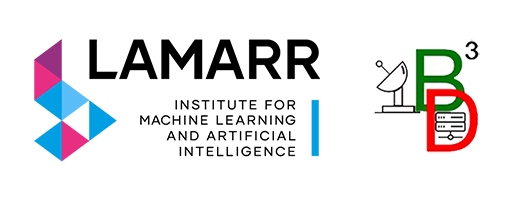-
Overview Talks
On the first day, overview talks are intended to provide a broad overview of a particular topic and related research, e.g., hybrid machine learning, astroparticle physics.
-
Physics
The physics part of the overview talks provides an introduction to the research areas of astroparticle physics (e.g., gamma-ray and neutrino astronomy), radio astronomy, and high-energy particle physics. The presentations include a brief introduction to the underlying research questions, instrumentation, and data structure. Data analysis tasks and problems are presented.
-
Machine Learning and Computer Science
The computer science and machine learning part of the overview lectures gives an introduction for selected research fields in computer science and the Lamarr Institute in particular (e.g. Hybrid ML or databases). The lectures include a brief introduction to the research fields in question, the goals, and the methods developed. Furthermore, application examples are given and data requirements are provided.
-
-
Pitch Talks
On the 2nd and 3rd day there will be pitch talks on selected research topics. The goal of these talks is to build on the overview talks of the first day and provide a brief insight into exemplary topics from the fields of physics and machine learning. Examples from previous collaborations between computer science and physics will be presented, as well as currently researched methods from machine learning and research questions and learning tasks from physics experiments. The mutual requirements for methods and data, as well as their structure, will be briefly discussed.
-
ML Methods and Application Examples (in Physics)
The ML Methods and Application Examples session focuses on the presentation of ML methods and research, as well as experiences on their application in analyses in physics.
-
Inverse Problems
The "inverse problems" session deals with the subset of methods based on computing from a set of observations the causal factors that caused them. Methods with this requirement are typical for analyses in astrophysics, particle physics and radio astronomy. Furthermore, they are also a research subject in machine learning.
-
Problems and data sources
The "problems and data sources" session highlights various analysis problems from physics, machine learning analysis methods and their data requirements, and describes data sets from physics and their structure.
-
-
Coffee break with poster session
The pitch talks are followed by a coffe break with poster session. Participants are free to use the coffee breaks for more in-depth exchanges about their research. The coffee breaks will therefore be accompanied by a poster session. Participants are encouraged to bring posters about their own research at the beginning of the meeting and hang them in the coffee break area. The posters should be used to give a brief insight into their research topic and serve as a basis for conversation about it.
-
Discussion groups (Open space)
The discussion groups serve the purpose of an in-depth exchange on specific topics, including those that arose from the pitch talks and poster sessions. Various topics can be discussed in these groups to create synergies and provide ideas for joint projects. They enable brainstorming and the development of initial ideas for future projects and collaborations. In addition, they enable the exchange on specific topics in more detail. The discussion groups can be registered in advance or during the meeting. There are several meeting rooms available for which time slots can be booked.
-
Social Activities
You can find an overview of the planned social activities here.
Choose timezone
Your profile timezone:

